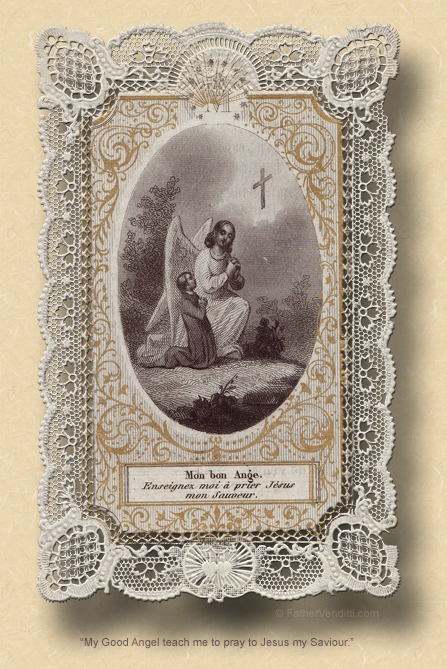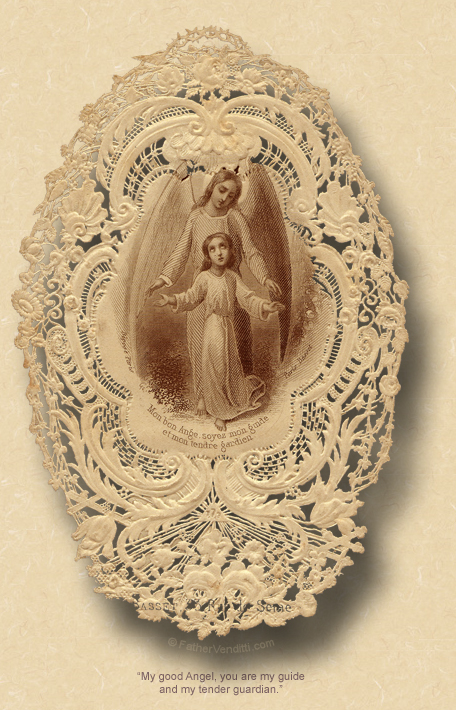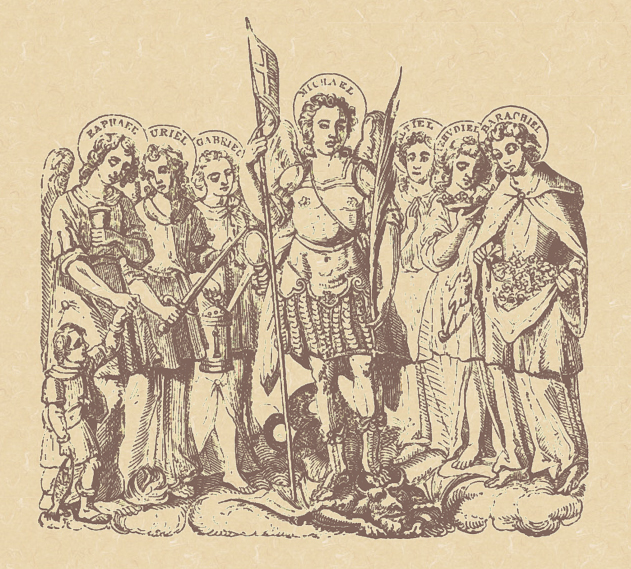It's Not a Social Program. It's a Religion.
The Feast of Saints Michael, Gabriel & Raphael, Archangels.
Lessons from the proper, according to the ordinary form of the Roman Rite:
• Daniel 7: 9-10, 13-14 (or Revelation 12: 7-12).
• Psalm 138: 1-5.
• John 1: 47-51.
The First Class Feast of the Dedication of the Basilica of Saint Michael the Archangel.*
Lessons from the proper, according to the extraordinary form of the Roman Rite:
• Apocalypse 1: 1-5.
• Psalm 102: 20, 1.
• Matthew 18: 1-10.
The Nineteenth Thursday after Pentecost; and, the Feast of Our Venerable Father Cyriacus the Anchorite.**
First & third lessons from the pentecostarion, second & fourth from the menaion, according to the Ruthenian recension of the Byzantine Rite:
• Phillipians 3: 1-8.
• Galatians 5: 22—6: 2.
• Luke 6: 12-19.
• Luke 6: 17-23.
FatherVenditti.com
|
 10:35 AM 9/29/2016 — I've always had a special interest in and devotion to the Holy Angels of God, and not simply because I'm named after one of them. As you've heard me say many times now, I'm very sensitive to those who attempt to rewrite the Gospel to turn Christianity into some sort of social program, and devotion to the Holy Angels of God pretty much makes that impossible, since there are few things found in Scripture more shrouded in mystery and more indicative of the supernatural than the angels. 10:35 AM 9/29/2016 — I've always had a special interest in and devotion to the Holy Angels of God, and not simply because I'm named after one of them. As you've heard me say many times now, I'm very sensitive to those who attempt to rewrite the Gospel to turn Christianity into some sort of social program, and devotion to the Holy Angels of God pretty much makes that impossible, since there are few things found in Scripture more shrouded in mystery and more indicative of the supernatural than the angels.
And found in Scripture they are in abundance. They are all over the Old Testament, visiting Abraham, speaking to Isaiah, feeding Jeremiah in the wilderness, delivering the Word of God to Ezekiel, and on and on and on. The New Testament, of course, begins with an angel announcing to our Blessed Mother that She would be bringing God into the world in the Person of Jesus. Angels announce to the shepherds His birth, they minister to our Lord in the desert and during His agony in the garden, and they appear again to bear witness to His glorious Resurrection.
In our first lesson from the Book of Revelation, the Blessed Evangelist John takes us back to their origins in a highly symbolic way, recounting how they, too, were created with free will, and how one of them led an insurrection against God, for which he was banished with his minions to hell, and from where he and his followers, former angels known as demons, continue to ply their rebellion against grace by tormenting us with temptations away from the truth. How literally you want to take Saint John's narrative is up to you, but the moral truth he reveals to us is a matter of dogma, which is why it's in the Bible.
Yet, in spite of their phrenetic activity throughout Holy Writ, only three of them are mentioned by name: Gabriel, Raphael and Michael, though non-Scriptural traditions name a few others. Michael is a Hebrew name which means “Who is like unto God.” He is mentioned several times in the Book of the Prophet Daniel; in the Epistle of Saint Jude, where he is given the title of “Archangel”; and, in the Revelation of Saint John, in which he takes command of the army of angels tasked with putting down the Satanic revolution and driving Lucifer and his followers out of heaven. Hence, religious art in both the Eastern and Western Churches usually depicts him dressed as a soldier and brandishing a sword. Devotion to him as a popular saint probably began in Phrygia, which was a kingdom in central Anatolia, now present day Turkey, and which was the birthplace of ancient Greek Mythology. From there, it moved to Constantinople where it really flowered, and become particularly important as a symbol of the resistance against the many foreign invasions that continually beset the Eastern Empire. Hence, devotion to Michael and the angels has always been an important part of the spiritual life of the Eastern Churches. He is the defender of purity and truth, and we call upon his intercession particularly in times of temptation, when we are most vulnerable to attack by the Devil and his demons. In the Divine Liturgy of the Byzantine Rite, whenever the priest chants the Holy Gospel and distributes Holy Communion, fans called “ripidia” (ριπιδιον) are held over his head which bear images of six-winged seraphim, testifying to the presence of the angels at every liturgical service.
What celebrating this feast of the Archangels does is remind us of the fact that Christianity cannot be reduced to a mere social program, to a simple philosophy of brotherly love and concern. Its supernatural component is not something ancillary, a peculiarity of medieval superstition, something that modern Christians must now down-play to make their religion relevant in the contemporary world.  Jesus Christ is not a moral philosopher, He is God; His Resurrection from the dead is not a pious fairytale, it's a historical fact; and the grace of redemption that His death and Resurrection transmit to us is necessary for our eternal salvation. Our one purpose for being on this earth is to work out our salvation; everything else is just window dressing. If we are not enveloped in the grace of Christ given to us primarily through the Holy Sacraments of His Church, then we are not truly Christians. Jesus Christ is not a moral philosopher, He is God; His Resurrection from the dead is not a pious fairytale, it's a historical fact; and the grace of redemption that His death and Resurrection transmit to us is necessary for our eternal salvation. Our one purpose for being on this earth is to work out our salvation; everything else is just window dressing. If we are not enveloped in the grace of Christ given to us primarily through the Holy Sacraments of His Church, then we are not truly Christians.
The Church has a prayer directed to the Archangel Michael that most of us know, since we say it every day here at the conclusion of our daily Rosary. There's a lot of conflicting speculation about the origin of this prayer which need not concern us; nevertheless, in 1886 Pope Leo XIII included it in a set of prayers that he required be recited at the conclusion of Low Mass, which are sometimes called the “Leonine Prayers.” It's use in the Ordinary Form of the Roman Rite was suppressed in 1964, but Pope Saint John Paul II had particular devotion to the Prayer to Saint Michael, and it remains, of course, part of the Mass in the Extraordinary Form today. The words of that prayer sum up beautifully not only what devotion to the Archangel Michael, and all the angels, is all about, but also remind us of an essential fact about the Communion of the Saints, of which the Holy Angels of God are a part: even when we're not thinking of them—even if we've gone for many years without giving them any thought or asking for their help and protection—they're still there, protecting us, praying for us, staying the hand of God's justice when we sin, rejoicing for us with every temptation resisted; and, while it may seem schmaltzy and childish and just a lot of pious pap, I happen to believe that, whenever we fail to meet our obligations in our daily prayers and spiritual exercises, our Guardian Angel finishes the prayers for us.
We don't often feel their presence, just as we don't often feel the presence of Our Lord Himself, especially in those dark nights through which we pass several times in our lives. But, as I've said to many of you in confession, we can't make the mistake of regarding our spiritual exercises or liturgical obligations as some form of therapeutic activity. We don't pray, we don't offer the Holy Sacrifice, we don't perform our spiritual exercises every day in order to feel good about ourselves and get some sort of inner enlightenment; we do these things because God deserves our worship and we owe these things to Him. If they make us feel content and give us some sort of inner peace, all well and good; but, if they don't, too bad; we still have to plow ahead and do them, invoking that all-illusive virtue of Hope we've spoken so often about here to remind us that all dark nights are passing if we keep faith and persevere.
Confitebor tibi, Domine, in toto corde meo, says today's Psalm, quoniam audisti verba oris mei. In conspectu angelorum psallam tibi…. “I will give thanks to you, O Lord, with all my heart, for you have heard the words of my mouth; in the presence of the angels I will sing your praise…” (Psalm 138: 1 RM3).

* Pope Boniface II built and consecrated a basilica dedicated to the Archangel Michael on the site of the Roman Circus, where so many Christians met their deaths, and this feast commemorates that event. In the Missal of Bl. Paul VI, the feast was reduced in rank, and became a celebration of the three Archangel's named in Scripture rather than the dedication of a church; hence, the feast in the ordinary form.
** Born in Corinth, Cyriacus came to Jerusalem at the age of eighteen to receive the habit of a monk from the hands of St. Euthymius the Great. He later served as Hegumen (abbot) of the Monastery of St. Chariton, opposed the heretical views of Origen, and died in great holiness at an advanced age in the year 556.
|

